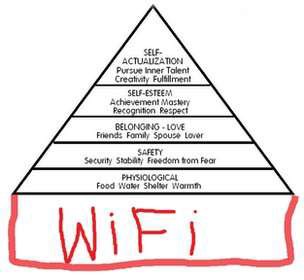Politicians make a big deal about the unemployment rate. Obama bragged in the SOTU last year that unemployment is down by half since he took office. Jobs! Gotta create jobs!
This is backwards. Most people don’t like their jobs. They work because they have to work in order to live, not because they want to. We ought to be striving to destroy jobs, not to create them. The unemployment rate should be going up, not down. That’s the promise of the industrial revolution: that nobody should have to work unless they want to.

Of course, our system of economics today isn’t ready for that. The American Dream is predicated on radical individualism, on every one providing for themselves, and under that mentality there is no way to live without work. In order to find one’s way up Maslow’s hierarchy, one needs money, and the only way to make money is to work. This makes no sense in a context of abundance. When there is less work to do than there are hands to do it, this system will create busywork. We will invent jobs for people to do in the name of reducing unemployment, that bogeyman. Because that’s the only way within our economic system to boost them past the second layer of Maslow’s hierarchy (safety).
But in the US there exists enough wealth to ensure the safety of every citizen, ensure that every single person has enough to eat and a place to live. Why make them look busy? Why force them to do something they don’t like doing, why get in the way of their progression up the hierarchy through belonging, mastery and fulfillment? The industrial revolution has blessed us with the ability to put everyone squarely above the second layer of Maslow’s hierarchy. But like a mean older brother, we’ve decided to make everyone squirm and fight for it.
Today, many employers can get away with paying workers extremely poorly and bearing little respect for them or their wellbeing, because those workers have no other way to pay for their basic needs. There’s no need to coax or convince a worker to work when Maslow is doing that for you. This approach to employment will not hold up when people aren’t forced to work. Nobody would take a low-paying, demeaning job if they didn’t have to. So the price of employing people will go up, and employers will need to think about how to make people want to work for them (or if possible, about how to automate the work such that they need drastically fewer employees). This is already happening. Look at all the feverish hand-wringing about how millennials just don’t respect the value of hard work or aren’t thankful for simply having a job.
Of course we don’t respect that! We expect more from our society.